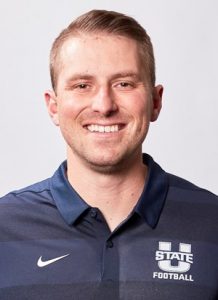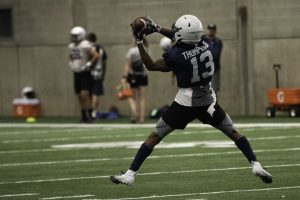Aggies’ OC: No changes in offensive system for 2019
When football teams bring in a new coaching staff, typically the first thing on the to-do list in offseason practices and team meetings is teaching the players a new system, be it a new offense or defense. Or both.
Utah State’s new offensive coordinator Mike Sanford Jr. isn’t taking that approach. Having seen the historic success of the 2018 Aggie offense, Sanford has no plans to fix a system he doesn’t see as broken.

Utah State football Offensive Coordinator, Mike Sanford Jr. – Photo via Utah State Athletics
“I want to take what they were really good at last year and make it better,” Sanford said on a recent episode of The Statesman Sports Desk podcast.
Jordan Love parroted Sanford’s statement at USU media day last week.
“Offensively, we’re running the same thing,” the junior quarterback said. “Obviously, some plays here and there will change, just the way we read plays. For the most part it’s stayed the same.”
The reasoning behind the lack of change is simple. Aside from the “if it ain’t broke, don’t fix it” mentality, the fact Utah State is so inexperienced on the offensive side played a role in the decision for Sanford.
“When you come in and follow success offensively and you actually lose personnel, the last thing you want to do is create even more indecision, because there’s inexperience, and bring a completely new offensive system,” the new OC said.
Again, Sanford’s junior signal caller is on the exact same page, who spoke to the media of the benefits of not needing to learn a new offense.
“That’s helped a lot,” Love said. “Usually with new coaches coming in, you’ve got to learn a whole new offense, a whole new scheme, stuff like that. It’s made it easy just knowing we’re on the same page.”
Exact replication of the 2018 offensive style itself may be difficult with the talent at hand. It’s not just that nearly all the top statistical producers at relevant positions are gone, it’s that many of the incoming players come from different archetypes.
“It’s a different group, that’s for sure,” Love said of his new pass-catching targets. “I’d say last year, (the wide receivers) were more, not as much speed, more big bodies. Just try and put the ball on them, stuff like that. But I think this year that’s what will be different. I think we’ve got more speed out there.”

Utah State’s football team run drills during the fall camp on August 3, 2019.
Speedier and also smaller. Those two characteristics come to mind when scrolling through wide receiver section of Utah State’s 2019 roster. From the tall, big and comparatively slow targets of Ron’Quavion Tarver (6-foot-3, 215 lbs) and Jalen Greene (6-foot-2, 205 lbs) to the smaller but speedy returning players in Jordan Nathan (5-foot-8 180 lbs) and Savon Scarver (5-foot-11 190 lbs).
There is some height incoming for Love to throw to. University of Utah transfer Siaosi Mariner (6-foot-2) and junior college transfers Sean Carter (6-foot-4) and Derek Wright (6-foot-1) are taller wideouts who could factor into the receiving rotation this fall. However, they lack the bulk (all weigh less than 200 pounds) Tarver and Greene had.
Given the corresponding increase in speed and athleticism, a decrease in size doesn’t feel like a downgrade. More of a sidestep or retool. But it does raise the question of how it will impact the way the passing game operates. As Love noted, Tarver and Greene excelled by getting to spots and catching the ball at said spots. Doing the same with the 2019 cast could be a waste of its greater speed and potentially damaging by trying to force a round peg into a square hole, so to speak.
This shift in personnel opens up opportunities for small variations in 2018 and perhaps even advancements on the concepts David Yost used to create the greatest Aggie offense of all time last year. Yost and Matt Wells built the offense on the premise of fast-paced offense but didn’t have elite speed. Sanford’s squad is faster, quicker and arguably just as athletic (if not more so).
It’s not just the wide receiver position that is reloading and getting potentially quicker. At tight end, the Aggies added highly athletic Caleb Repp in addition to returning backup Carson Terrell. Panning to the running backs, Jaylen Warren steps in, a JuCo All-American and NJCAA Offensive Player of the Year, who projects as a smaller, quicker version of the departed Darwin Thompson.
Simply put, Utah State won’t change the offensive system that shattered school record books and is retooling said offense with more speed and athleticism. Adding speed to a speed-based offense is an exciting prospect.

